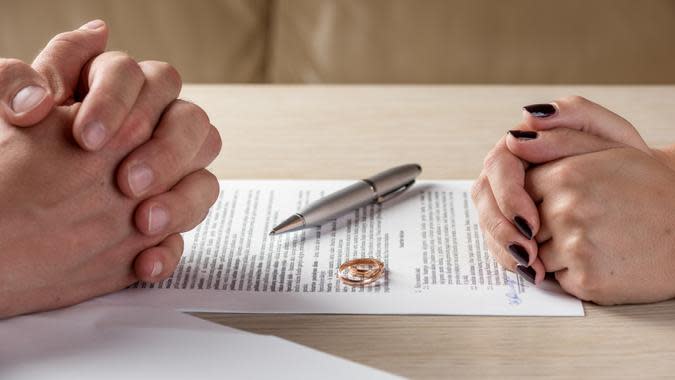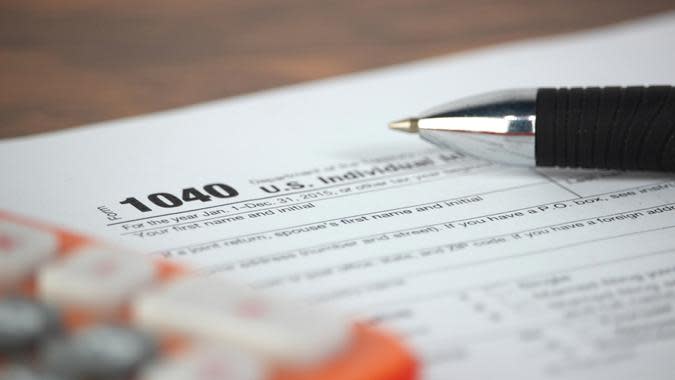10 Things You Need to Know About Your Money When Getting a Divorce

It's true that breaking up is hard to do, and the difficult changes don't all involve the heart. In addition to severing your emotional bonds with your spouse, divorce changes many aspects of your financial life. Some are obvious, like the fees you'll pay for your divorce attorney. But some involve areas of your finances you may never have considered related to your marriage.
Housing Market 2023: Is a Double-Digit Drop in Prices Coming?
Read: How To Build a Financial Plan From Zero
We worked with several divorce experts to compile this list of things you need to know about your money as you divorce. Learn more about these divorce secrets you need to know.

1. Cost of the Divorce Process
Divorce ushers specific monetary challenges into your life and also changes the way you view a host of financial issues. But let's start with the process itself, which can cost big bucks, especially if one spouse is antagonistic. The cost of a divorce varies around the country, but a national survey by the legal website NOLO found that the average cost of a full-scope divorce lawyer is $11,300. Although hourly rates ranged from $100 to $400 or more, nearly 70% of individuals surveyed paid their attorney between $200 and $300 per hour. Add to the total post-divorce costs like therapy and financial planning services.
What to do: Keep costs down by working out contested issues through mediation or arbitration. Lawyers' fees are the largest part of the cost of divorce. If you fight over an issue and it goes to trial, you may win the point yet lose the same amount or more in hourly fees. Think compromise instead of victory and you'll pay less in the long run.
Take Our Poll: What Do You Plan To Use Your Tax Refund For?

2. Problems Accessing Cash
"Cash can be the first thing to disappear when a spouse files for divorce," said divorce attorney Chris Hildebrand, general partner with Hildebrand Law in Scottsdale, Ariz. Many times, Hildebrand said, the spouse filing for divorce clears out half of the available cash, leaving the other half in the account. But not always. If one spouse controls the bank accounts, that gives him or her extraordinary leverage in a contentious divorce. The other person may have problems accessing cash.
What to do: Act now to open a solo account at a different bank and deposit some money there. The best way to protect yourself from financial extortion is by having access to your own money. As an added bonus, you'll get a jump on financial independence.

3. Cost of Getting Emotional
According to consumer expert and nationally syndicated columnist Clark Howard, your approach to divorce can cost you money if you're not careful. One factor in how the divorce financial balance sheet comes out is how much attention each person pays to the bottom line.
"Men tend to look at divorce as a financial thing," Howard said, "while women are typically more emotional and tend to pay less attention to the financial agreement. And what ends up happening is that women often end up significantly poorer than men after a divorce." It's not just divorce -- your emotions are making you broke.
What to do: The end of your marriage, whatever caused it, will likely make you sad. But don't let that deter you from walking through the money details of the split. "So while your heart is hurting," Howard said, "your wallet will end up hurting more in the long run if you don't pay close attention to the financial aspects of the divorce."

4. Mortgages and other Loans
If you and your spouse own a house, odds are you have a mortgage. You may also have other loans the two of you took out during the marriage. Don't be lulled by the fact that the judge awards debts to your spouse to pay, or splits them between you.
"No matter what the divorce decree says about a loan -- he's going to pay for this, she gets that -- the lender doesn't consider any of that," Howard said. If both of your names are on the loan and the judge orders your ex to pay it but he doesn't, the lender can come after you, too. "You are still financially liable for that loan," Howard said. "Regardless of the terms of the divorce settlement, the lender wasn't part of that. And since the creditors made the deal with you, they're not letting you off the hook."
What to do: To avoid this situation, make sure that if your spouse is assigned debt in the divorce, the loan gets refinanced, removing your name. "That will relieve any legal responsibility for it," Howard said.
Housing Market 2023: Is a Double-Digit Drop in Prices Coming?

5. Lower Household Revenue Post-Divorce
"I don't care how rich you are, when you go through divorce you have less," said Emma Johnson, founder of WealthySingleMommy and author of the new book "The Kickass Single Mom: Be Financially Independent, Discover Your Sexiest Self, and Raise Fabulous, Happy Children." It takes less money to maintain one united household than two separate houses. "There are other ways married people save money, whether it is a shared Costco membership, sharing travel and accommodation costs on vacation, or reduced child care," Johnson said.
What to do: Take advantage of your newfound freedom to follow a better career path. During the years following her divorce, Johnson said her financial situation improved dramatically. "Forced to return to work full-time, and no longer married to someone who questioned my career decisions, I was able to build a business that grosses about three times our household income when married," she said.

6. Unpaid Child Support
Each parent has a legal obligation to provide financial support for their children, and often that is enforced by court-ordered child support payments. If you are the custodial parent, these payments help cover your monthly expenses and those of your children. But relying on your ex for support may not feel safe. What if the payments stop coming?
What to do: Be sure you get a withholding order for support payments from the court at the time of the divorce. That way, your ex's employer withholds from each of his paychecks the amount required to pay family support. The money is then forwarded directly to you.
Collecting child support is more difficult if your ex frequently changes jobs or is self-employed, Hildebrand said. If you don't get the payments, file a motion to have the non-paying parent held in contempt of court. The judge can toss your ex in jail and provide for work release during the day until the child support payments are current.

7. Taxes Post-Divorce
Your tax status and deductions change after a divorce, and single-income families can encounter big tax problems. If the calendar year ends and your divorce is still pending, you'll have to file as "married filing separately" or "married filing jointly" for that year. Once the divorce goes through, you cannot claim head of household status unless your kids live with you at least half the year. Only one parent can claim children as dependents. A noncustodial parent can only claim the kids if the custodial parent signs IRS Form 8332, Release of Claim to Exemption for Child of Divorced or Separated Parents.
What to do: If you and your ex-spouse agree, you can claim the kids as dependents during alternate years.
I'm a Self-Made Millionaire: These Are the 6 Investments Everyone Should Make During an Economic Downturn

8. Retirement Needs
Retirement looks different if you move from being a stay-at-home parent with a high-earning spouse to a divorcee. Many who divorce end up in that large group of people who are below or just barely above the poverty line when they retire. You need to keep retirement benefits in mind as you draft a divorce settlement. Remember, divorce could affect your Social Security benefits, too.
What to do: While you are splitting assets in the divorce, consider the future value of each asset rather than just focusing on its present value. The increase in value of retirement accounts isn't taxed, and these accounts will be worth more in the long run.

9. Emergency Fund
You may have heard that you should put away three to six months' living expenses to provide a financial safety net in case income stops. But before your divorce, it probably didn't seem critical given the two wage earners in the family. If one of you lost your job, the other could carry the family in the short term. After a divorce, that emergency fund becomes critical. If your salary stops coming in, there's no second salary to count on. This is also important because you may not have access to the credit you need following a divorce.
What to do: In post-divorce financial planning, prioritize the emergency fund. That cash fund will protect you in case the unexpected strikes. Set a target amount and then, starting from the moment you file divorce papers, deposit all spare funds into the account until you meet your goal.

10. Insurance Post-Divorce
Insurance needs increase once divorce papers are filed. Hildebrand said some states, such as Arizona, have laws preventing one spouse from removing the other from a health insurance plan during the divorce. Once the divorce is final, however, that spouse must obtain his or her own health insurance coverage. But health insurance isn't the only insurance you need after a household moves from two wage-earners to one. You also should consider insuring your ability to generate income.
What to do: Purchase long-term disability insurance. When your income is the only income, you need to protect it in case you get sick or injured and cannot work for an extended period.
More From GOBankingRates
Daria Uhlig contributed to the reporting of this article.
This article originally appeared on GOBankingRates.com: 10 Things You Need to Know About Your Money When Getting a Divorce
